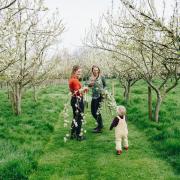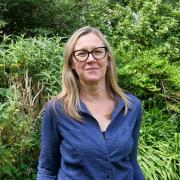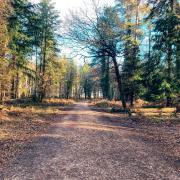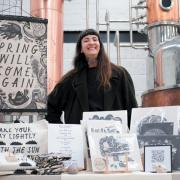Carole Varley meets the heroes of the high street when she spends a day in Brockenhurst...
Ye olde village shoppe
Given that it was created almost 1,000 years ago for William the Conqueror to hunt in, the New Forest might not be quite so new these days but, as a national park with Europe’s largest surviving area of ancient pasture woodland where wild ponies, deer and cows can still roam at will, for the retailers of the village of Brockenhurst, it is a wonderful place to work.
A short stroll down the village high street, for instance, will bring you to the premises of Spencers estate agent, whose director Robert Batten will tell you that, surrounded as it is by leafy forest, Brockenhurst also enjoys good links with the nearby motorways of the M27 and M3 and frequent South West Train services whisking villagers to London Waterloo in less than two hours and to Southampton and Bournemouth. That is perhaps why the village is bucking the trend when it comes to house sales, says Robert.
“We’re in a bit of a bubble here from the outside world, as we’re still experiencing good demand. There are a lot of people coming from outside – second home-owners and many commuters, who can now split their week between working at home and the office. The village ticks so many boxes for people who want to retire or move out of London. Here you can also walk to school, walk to the station and walk to the shops. People love that.
Other villages don’t have all the amenities we have.”For himself, Robert, says that it is a great place to earn a living, with “a really close-knit community where everyone knows everyone. It’s a very friendly village, with newcomers’ evenings and cinema nights in the village hall. For me it was a great bonus coming to the Forest, not least because I can bring my dog in with me every day.”
Indeed, it is the animals in the Forest that surprise many of the village’s visitors, according to Richard Wolstenholme, who has been running Pot-Pourri, a novelty gift and card shop for the past three years, although the shop has been in the high street for 26. “They’re amazed to see all the animals wandering freely around,” he says. Richard, who used to work in a bank, says that now he wouldn’t want to be anywhere else.
“Brockenhurst is small enough to be friendly, but busy enough to make a living. We get all nationalities of campers, caravanners and walkers here. There’s a real bustling village feel – but it’s not just for the tourists. We do well in the winter, too. You might not be able to get a huge selection of anything, but you can get virtually everything on the high street.”
That even goes for quality clothes and shoes for both men and women, as purveyed by Claywood, across the road, and antiques, from Richard’s friend Pam Rabbitts’ shop, Brock Ante, just a few doors down.
For Pam the shop, which she has owned for three years, was a hobby that developed into a business about 10 years ago after she moved back with her husband from Holland and Belgium, where she first developed her love of antiques.
“People are beginning to realise that you can buy better second-hand furniture than you can new, and that you don’t have to go far to find it. It’s also very green, from the point of view of recycling,” she says. Although she does enjoy interest from visitors from far afield, Pam says that she also has many local regulars, a few of which were chatting away there when I arrived.
“Lots of people just drop in for a natter and to browse around. We have a great deal of older properties here, and people are often looking for furniture that is sympathetic,” she says. Pam, who hails originally from Southampton, says that she wouldn’t dream of moving again.“We have everything we need to hand, including a good Italian restaurant. I love the Forest.”
The manageress of Claywood clothes shop, Karen Biddiscombe, must love it as well, because she’s worked in the village for 33 years. The shop itself can even beat that, as there’s been one there for more than 100 years. Now under the ownership of hairdresser Robert Bruce, who has a salon just across the road, Karen says, “Shops like ours are few and far between, as we are catering for the over-35s with traditional, high-quality classics.
"We have a very good local trade, but people also come from all over the country. We’re quite an attraction as lots of visitors don’t seem to have shops like this any more where they live. Somehow we seemed to have held on to our shops here."
Being in the middle of the New Forest, people want functional, wearable clothes. We have ranges here that you can’t easily get elsewhere, and many of our regular customers are holidaymakers who come to the Forest once or twice a year and just drop in while they’re here to have a look round and see what we’ve got.”
That the village is tight-knit was well illustrated when I entered Village Veg, the high street greengrocer’s, as the owner Nick Munnik wasn’t at all surprised to see me, having been warned on the grapevine that I was on the prowl. Nick, who took over the shop about three-and-a-half years ago, says that, although most of his customers are locals from the village and from neighbouring Sway and Lyndhurst, “the holidaymakers certainly keep us going. We’ve all ridden the recession.”
Nick tries to source his vegetables locally when he can, with tomatoes from the Isle of Wight that “smell like tomatoes” and Hampshire-grown watercress, asparagus and strawberries when they are in season. Because of this renewed interest in buying local produce, Nick says that they are now seeing food producers starting up in the area, and his mission is to get everyone back into the habit of shopping locally, particularly given that his produce “can often come out cheaper than that in the supermarkets, contrary to a lot of popular opinions”.
Also Nick, who provides vegetable boxes and supplies many of the local hotels and pubs, carries a lot more lines than you might think a village veg store would, from Chinese radish and wild mushrooms to pak choi and sweet potatoes. He chuckles, “Some of the local chefs can tax us a bit, with requests for purple potatoes and such like. But we mostly seem to manage.”
At the Bakehouse, across the road, Steven Jose is one of five generations of bakers in the Forest area, starting with his great-grandfather Ebenezer, his grandfather, James, his father David and his son James, and today the Bakehouse still uses the recipes that Ebenezer did, hand-making bread with sourdoughs that have been matured for 30 hours to “provide long-lasting freshness without the use of preservatives”.
To say that this is a family affair is almost an understatement, given that, as well as his son James and brother-in-law Steven White, who are both bakers, Steven’s daughter Nicola, and nieces Katie White and Sara Sturmey also work in the business.
Even then, Steven says that they are “rushed off their feet all day every day”; probably because there are so few artisan bakers around on high streets these days, making traditional breads with stoneground wholemeal and organic flours, baked in authentic stone ovens.
Another traditional family business at the top of the high street is Streets Ironmongers, owned by brothers David and Alan Bartlett, with the aid of wife Alison, 14-year-old daughter Laura and 16-year-old son Sam, who help out on Saturdays and in the school holidays.
An Aladdin’s cave of ironmongery, Streets stocks everything from electrical and garden supplies, to household ware and camping goods – in fact, according to David, 12,000 different items. They also cut keys and wood and provide paraffin from an old petrol pump that once graced the village.
“There has been an ironmongers on the site since the 1920s, but over the past 15 or 16 years, we have grown a tremendous amount. We just seem to get busier and busier,” says David. “We have a very good local trade, but people also come from all over the country. We’re quite an attraction as lots of visitors don’t seem to have shops like this any more where they live. Somehow we seemed to have held on to our shops here.”
Perhaps this is because, as Richard Wolstenholme of Pot Pourri put it, the villagers have realised that, as far as their shops go, if they “don’t use them, they will lose them”.
It doesn’t look likely that that will be happening in Brockenhurst any time soon.


























